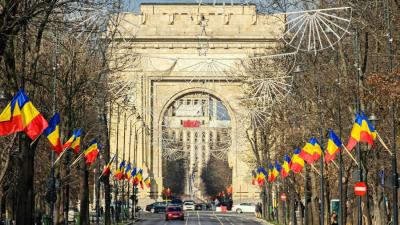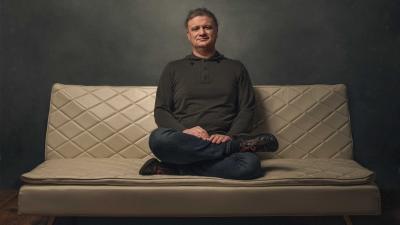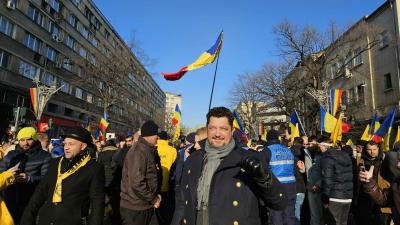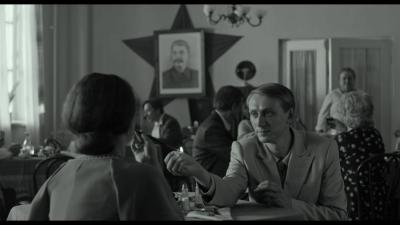In a world where every day we wake up to news that turns upside down what we took for granted, as we are seeing in Syria or South Korea, Romania has made its mark with the surprising result of the first round of the presidential elections.
A surprising result because neither of the two big parties, socialists and liberals, will be present, nor will the nationalist party AUR (Alliance for the Union of Romanians), which most of the polls also expected to be in the second round. No, the second round will finally be disputed this Sunday between the independent candidate Colin Georgescu, who obtained 23%, and the candidate of the USR (Union Save Romania), Elena Lasconi, who obtained 19%.
Without a political party to back him and with a campaign made mainly on Tik Tok, the polls gave Georgescu a scant 6%, but he has won the vote of more than two million Romanians. His victory, inexplicable to many, has brought to light many of his past statements in favor of the Iron Guard (the Romanian fascist movement in the interwar period), Marshal Antonescu, which was Germany’s ally during World War II, and more recently showing his admiration for Vladimir Putin. Photos have even surfaced of a 2014 conference in which Georgescu sits next to Alexander Dugin. The Russian ideologue, in one of his usual imperialist rants, has assured last Monday that “Romania will be part of Russia”. Georgescu has also been highly critical of NATO, although he has denied being in favor of leaving the transatlantic organization or the EU, and has expressed his opposition to the “old corrupt parties” although without pointing out any concrete measures. Logically, all this has set off alarm bells about possible Russian interference, and after the appeal for annulment filed by another of the candidates, Cristian Terhes, the supreme court ordered a second recount of votes that has finally validated the results of the first round of the presidential elections.
It is very hard to believe that the more than two million Romanians who voted for Georgescu are nostalgic ‘ultras’ or pro-Russian, even though that has been the message most often heard in the media. AUR, which since its irruption in parliament in 2019 has received similar qualifiers, got 14%, just over 1.2 million votes; that is, Georgescu may have picked up votes from AUR or other smaller right-wing parties, but this is not enough to explain this result. The only possible explanation is that Georgescu, as an outsider, a candidate against all others, has received the vote of those dissatisfied with the system, of those who have stopped believing in the traditional political parties, who have stopped voting, but are willing to do so when an alternative candidate promises to break the deck. This phenomenon has already occurred in several Western countries in recent years and does not respond to ideological lines.
On the other hand, the result of Elena Lasconi, who ended up beating the Socialists by a slim margin, is also surprising. Lasconi was removed from USR’s lists for the European Parliament, where her party is part of Renew, for declaring that she voted ‘yes’ in the 2018 pro-traditional family referendum. Poor election results allowed her to take control of the party and become its president in June, but she subsequently changed her position stating that she would vote ‘no’ if a referendum were now held and showing her support for civil unions “with all his being”. Although her party claims to be liberal-conservative and Lasconi has stated that she “wants a right-wing government”, many consider his candidacy as ‘progressive’, something that does not bring votes in a country as traditional as Romania. In the parliamentary elections held on Sunday, the USR dropped from 15% to 12% of the vote.
The ruling parties, the grand coalition formed by the Social Democratic Party and the National Liberal Party, which had its greatest expression in the formation of a joint list for the European Parliament, suffered a resounding defeat in the parliamentary elections. The Socialists were the most voted party and obtained 22%, but lost 7 points, while the Liberals went from 25% to 14% of the votes, becoming the third political force two points above the USR. AUR doubled its results, from 9% to 18%, and has become the second force. Two other populist right-wing parties also entered parliament: SOS Romania, led by the controversial Diana Șoșoacă who was expelled from AUR, which obtained 7%, and POT (Youth Party), led by a former AUR deputy, Anamaria Gavrilă, which was the only party to support Georgescu and got 6%. Finally, the Democratic Union of Hungarians of Romania (UDMR) obtained 6.5%.
On Tuesday morning, I zoomed in on a press conference given by George Simion, in which the president of AUR affirmed that his party “was the winner of the elections” for having doubled its results in the face of the debacle of the ruling parties. For Simion, the key to AUR’s good result lies in having remained faithful to its principles, because “we cannot lose what we are”. Another determining factor was the vote of the Romanian diaspora, very numerous in countries like Italy or Spain, where AUR went from being the second or third most voted party in the previous elections, to reach the first place. For Simion, the reason for the success lies in the creation of partisan groups in the different Romanian communities, which have also been reinforced by the frequent visits of Simion himself, Claudiu Tarziu and other prominent members of AUR such as Dragos Moldoveanu. In fact, Simion visited the Romanian community affected by the floods in Valencia, which is the largest group of foreigners in that region, to inquire about the situation of his compatriots a day before the president of the Spanish government, Pedro Sanchez, who was not well received by the Valencians, came to see the disaster.
“People are tired of political parties,” said Simion, who pointed out that his party was going to support Georgescu in the second round for “defending traditional family values,” while making it clear that he did not consider him a “perfect” candidate. Asked by journalists what he was referring to, Simion replied that AUR “does not support war criminals” and that his party is committed to Europe and the United States, but is clear that it cannot give in to everything Brussels asks for and it is necessary to “negotiate harder”. Simion also praised Trump’s proposals to achieve peace in Ukraine and pointed to Italian Prime Minister Giorgia Meloni as a “role model”. “We are part of the solution, not part of the problema” concluded the AUR president.
The formation of a new government does not seem easy, although, in principle, a coalition of socialists, liberals and the party of the Hungarian minority, to which the USR should be added, could be repeated. However, it is clear that this kind of coalition imposes a very high electoral cost and does not ensure the formation of a stable government either. All this without forgetting the controversial presidential election which will take place this Sunday and which, whatever the outcome, is having a strong polarizing effect on society. The Liberals have already announced their support for Lasconi, but the Socialists are being ambiguous and, for the moment, have not opted for any candidate. As of today, any outcome is possible.
Read also
Interview with Miguel Ángel Quintana Paz: "More and more people who are dissatisfied with the world realise that Catholicism has the tools to face today’s challenges".
Miguel Ángel Quintana Paz. Academic Director of the Higher Institute of Sociology, Economy and Politics (ISSEP) in Madrid. Professor at the postgraduate program “Expertise in Social Communications” at the Pontifical University of Salamanca.
Álvaro Peñas
Time for AUR?
According to the latest polls, the Alliance for the Union of Romanians (AUR), born in 2019, would be the first choice for the majority of Romanians in the next European elections, and could win up to 12 MEPs.
Álvaro Peñas
Corruption sinks Portuguese socialism
Socialism has the peculiarity that it impoverishes the countries in which it governs, but makes those who govern rich. In Portugal, after a year of corruption scandals involving ministers and senior members of the Socialist Party, it has finally been the turn of Prime Minister António Costa.
Álvaro Peñas
The Banned Writers of the Slovo House
The Holodomor is a genocide that has become better known as a result of the Russian invasion of Ukraine, but when the crime was committed almost a century ago, the world did not know or did not want to know, and only a few voices, such as the journalist Gareth Jones or the Austrian engineer Alexander Wienerberger, dared to denounce the barbarity committed by Stalin.














Comments (0)